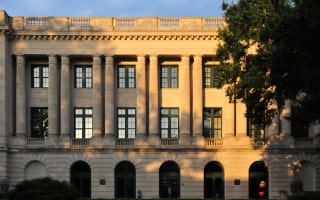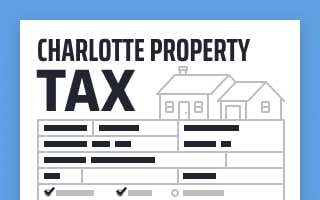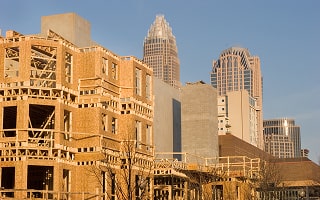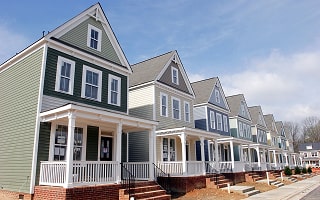How to Search for Charlotte Property Records

Property records are official documents that contain information about real property and its owners. They are public records that anyone can access at any time without reason. The resources below allow you to find property records for Charlotte, North Carolina, easily. You have the option of using official government sources or private commercial sources. Some of the details you may find are property owners' information, property values, taxes, mortgages, liens, foreclosures, building permits, and more.
My Charlotte Lookup
The City of Charlotte created a website with a lookup tool to help Charlotte residents find information about their property or others. Anyone can use the tool for free to find ownership records, zoning information, trash pick-up schedules, capital improvement and commercial projects nearby, and even voting precincts. You can search by using the property address.
Mecklenburg County Lookup
Mecklenburg County has also created a property website where you can search for property records using the owner's name, property address, or parcel ID. You are likely to find the deed, mortgage, lien, building permits, and foreclosure information here.
Mecklenburg County Assessor's Office
If you are searching for tax information or property values, the Mecklenburg County Assessor's Office is the place to be. You can search business and residential properties to find property assessments, taxes, liens, and overdue tax payments.
Mecklenburg County Courthouse
Another place to look for Charlotte property records is the Mecklenburg County Courthouse. They will have case files and other public records related to property, like divorces, liens (mechanic's/judgment), foreclosures, bankruptcies, and probate cases. You can search on their website or visit in person for copies of records.
Charlotte Property Taxes

Charlotte, North Carolina, is located in Mecklenburg County. The Office of the Tax Collector is the government agency responsible for property taxes. They collect payments and send out notices for overdue taxes. They also have a list of foreclosure properties on their website. You can pay your taxes online through the Tax Collector's website.
![]() Assessments
Assessments
The Mecklenburg County Assessor's Office is the entity that performs annual property assessments to determine values for tax purposes. When a homeowner disagrees with the property assessment, they can file an appeal through the Board of Equalization and Review ("BER"). The instructions for doing so are on the Assessor's website.
![]() Appraisals
Appraisals
Property appraisals are a way of valuing property. They use different methods, but comparing recent sales of similar homes is the most common. In the case of annual assessments, if the building is new construction or unusual, the assessor may call on an appraiser to help value it for taxes. Estate planners, probate courts, and lenders also use appraisals to value property.
![]() Tax Rates
Tax Rates
Roughly 57% of the city's revenue comes from property taxes. These taxes pay for water, sewer, the transit system, tourism, public safety, risk management, street maintenance, fire, police, and infrastructure. As the city's expenses increase year over year, taxes rise to meet the budget's demands.
The median tax rate in North Carolina is 0.82% of the assessed value. Charlotte's median property tax rate is 0.4831 times $100 of property value. Different counties set various property tax rates. For example:
- Alamanace 0.4690%
- Burke 0.5600%
- Clay 0.4300%
- Gaston 0.5990%
- North Hampton 0.8300%
- Randolph 0.5000%
- Vance 0.7129%
North Carolina's property tax rates are considered low compared to the rest of the United States. Most are below the national average of 0.99%.
![]() Exemptions
Exemptions
Some property owners struggle to pay their annual property taxes. Thankfully, the city of Charlotte offers qualified individuals a break on their property taxes. The available exemptions in Charlotte, North Carolina include:
- Elderly Homestead Exemption
- Disabled Person Homestead Exemption
- Disabled Veteran Exemption
- Builder Property Tax Exemption
- Historic Property Deferral
To apply for one of these exemptions, you must visit the Mecklenburg County Property Tax Relief Department and apply online or through the mail. Once approved, your tax exemption will start with the following tax cycle.
Charlotte Building Permits / Inspections

Before starting any commercial building project, you must get a building permit from the City of Charlotte City Land Development Office. They handle permits for commercial buildings. For residential projects, you must get a permit through the Mecklenburg County Code Enforcement Office. Permits must be obtained when renovating, new construction, or demolishing a structure. Along with your application, you must pay the fee and submit supporting documentation like blueprints, material lists, contractor licenses, and others. Some of the permits you can obtain include:
- Building Permit
- Electrical
- Mechanical
- Plumbing
- Commercial
- Interior Demolition
- Total Demolition
- Fire Repair and Restoration
- Zoning Use Permit
- Sign Permits
Throughout the building process, the building inspector must inspect the work to ensure that it complies with local building and safety codes. You can schedule your inspection online or by calling 980-314-CODE.
Real Estate in the City of Charlotte

Charlotte, North Carolina, is a commercial and social hub with a population of 911,311. The city has a total of 379,904 housing units. Charlott's Housing Authority (CHA) manages 100 public housing units, 8,650 Housing Choice Voucher units, and 1,050 local, non-traditional units. Charlotte's diverse city has many different types of housing units, such as single-family dwellings, condominiums, townhomes, apartments, mobile homes, affordable housing, subsidized housing, and public housing. The median price for a home in Charlotte is roughly $375,900, with an average price of $244 per square foot. However, it depends on where in the city you live. Some examples are:
- Coulwood West (28216) $365,000
- Provincetowne (28277) $575,000
- Prosperity Church Road (28269) $432,000
- Silverwood: Median (28215) $360,000
- Highland Creek (28269) $450,000
- Back Creek Church Road (28213) $399.9,000
- Dilworth (28203) $740,303
- Downtown Charlotte (28204) $543,649
- Cherry (28207) $452,893
- First Ward (28202) $379,471
- Wilmore (28206) $627,666
- Brookhill (28203) $417,643
- Elizabeth (28204) $640,368
- Sedgefield (28209) $652,190
Charlotte's housing market is tight, with just enough units for residents. Houses stay on the market for only 10 days, and roughly 869 homes are sold there each year.



